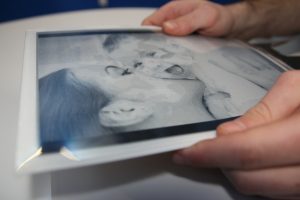A former student discusses how his pursuit of perfect grades may have cost him valuable lessons in real-world education. He further praises Doug Wightman’s CISC-492 class as a shining example of just such real-world learning. Read the whole story in the Globe and Mail.
Aneesh Tarun Demonstrates PaperTab
Watch Aneesh on Reuters TV as he demonstrates the revolutionary PaperTab, the new, flexible and bendable tablet, developed by the Human Media Lab, Plastic Logic and Intel Labs.
Roel Vertegaal Talks About PaperTab
 In interviews with the Dallas South News, El Paso Times, the Austin American Statesman and Electronic Times, Telegraph (UK), Mail on Sunday (UK), Times of India, News Track India, New Indian Express, Freepress Journal (India), USA Today, New York Daily News, Fox News, Dallas Morning News, Globe and Mail, National Post, Toronto Sun, Toronto Star, Computer World Singapore, Computerworld Malaysia, Computer World Australia, PC World, New Zealand Herald, Deccan Chronicle, Good Gear Guide, Orlando Sentinel, International Business Times, the Kingston Whig Standard, e-Queen’s, ioL.co.za (South Africa), China Radio International (English Service), Reason.com, Euronews, and a number of other national and international daily newspapers, trade publications and websites, Dr. Roel Vertegaal (Director, Human Media Lab, Queen’s School of Computing) commented on the revolutionary paper tablet computer, PaperTab, developed at the HML in collaboration with Plastic Logic and Intel. Future tablets, he stated, will be thin and flexible, and may revolutionize future tablets.
In interviews with the Dallas South News, El Paso Times, the Austin American Statesman and Electronic Times, Telegraph (UK), Mail on Sunday (UK), Times of India, News Track India, New Indian Express, Freepress Journal (India), USA Today, New York Daily News, Fox News, Dallas Morning News, Globe and Mail, National Post, Toronto Sun, Toronto Star, Computer World Singapore, Computerworld Malaysia, Computer World Australia, PC World, New Zealand Herald, Deccan Chronicle, Good Gear Guide, Orlando Sentinel, International Business Times, the Kingston Whig Standard, e-Queen’s, ioL.co.za (South Africa), China Radio International (English Service), Reason.com, Euronews, and a number of other national and international daily newspapers, trade publications and websites, Dr. Roel Vertegaal (Director, Human Media Lab, Queen’s School of Computing) commented on the revolutionary paper tablet computer, PaperTab, developed at the HML in collaboration with Plastic Logic and Intel. Future tablets, he stated, will be thin and flexible, and may revolutionize future tablets.
See a video on Korean TV here.
Added April 19: Roel was also interviewed for an article titled “Developing Bendable, Flexible Smartphones and Tablets”, in KIJK (Dutch science magazine).
David Skillicorn Weighs in on iPhone/Android Security Risks
In recent interviews with the Vancouver Sun, Calgary Herald, Ottawa Citizen, Montreal Gazette and several other Postmedia newspapers, David commented on the growth of iPhone and Android possibly becoming a security nightmare for the federal government.
2012 Highlights (click here!)
Congratulations to Gabor Fichtinger
 Congratulations to the School’s own Dr. Gabor Fichtinger (Director, Perk Lab, Queen’s School of Computing) on his appointment as a Distinguished Lecturer by the IEEE Engineering in Medicine and Biology Society. The letter of award states:
Congratulations to the School’s own Dr. Gabor Fichtinger (Director, Perk Lab, Queen’s School of Computing) on his appointment as a Distinguished Lecturer by the IEEE Engineering in Medicine and Biology Society. The letter of award states:
“EMBS Distinguished Lecturer is a major Society award, which recognizes your outstanding contributions in both research and education to the EMBS field of interest.”
Congratulations to Professor Jim Cordy
Congratulations to Professor Jim Cordy, who has been appointed an international Grand Professor at the Centre for Advancing Electronics Dresden (cfAED), a German national centre of excellence at the Technical University of Dresden. The centre, which includes industry partners from AMD, Intel, BASF, SAP, Infineon, Vodafone and more than 30 other companies, is focussed on addressing the current and future challenges of electronic information processing and communications technology, including the entire gamut from basic materials research to complex heterogeneous software systems. As part of his appointment Professor Cordy will spend one month each year on-site at the centre to act as senior mentor, postgraduate advisor and collaborator to the young scientists and students of the centre.

Congratulations to Hossam Hassanein
Congratulations to Professor Hossam Hassanein (Director, Telecommunications Research Laboratory, Queen’s School of Computing) on two recent Best Paper Awards:
1) “Benchmark Message Authentication Code Functions for Mobile Computing”
with Abdulmonem Rashwan (Ph.D. candidate) and Abdelhamid Taha (Adjunct Assistant Professor)
IEEE Global Communications Conference, Anaheim, California, December 2012
2) “Heuristic based Dynamic Spectrum Assignment in Cognitive Radio Network”
with Michael Liu (Ph.D. Candidate) and Nidal Nasser (Adjunct Associate Professor)
International Conference on Computing, Management and Telecommunications,
Ho Chi Minh City, Vietnam, January 2013.
Well done!
Computing’s Karilee Whiteway wins 2012 Queen’s University Special Recognition for Staff Award
We are extremely happy to announce that our very own Karilee Whiteway is a winner of the 2012 Queen’s University Special Recognition for Staff Award. This is a well- deserved honour for Karilee who distinguished herself through her exemplary dedication to the School’s research mission and her characteristic pursuit of excellence in carrying out her duties.
Karilee’s accomplishments and contributions to the life of the School were recognized by her colleagues and Queen’s Administration at the Principal’s Holiday reception. Read the whole story at the Queen’s News Centre. Congratulations, Karilee!
Targeting Women for Science: Queen’s School of Computing in the Globe and Mail
“It’s just appealing to what they think is important,” said University
of Ottawa engineering professor Catherine Mavriplis. Several studies
suggest “a lot of women are very socially minded – they want to help
people.”
Dr. Mavriplis points to Queen’s University, where nearly a third of
bachelor’s students in computing are women – far above the average.
The school has an option in biomedical computing – which incorporates
the life sciences, where women are a strong majority of students –
and it has proven popular. “You don’t even have to change the course
that much. You still have the heavy programming, but just tell them,
`okay, we’re going to calculate how many blood cells there are in this
blood.'”
Read the entire Globe and Mail story here.